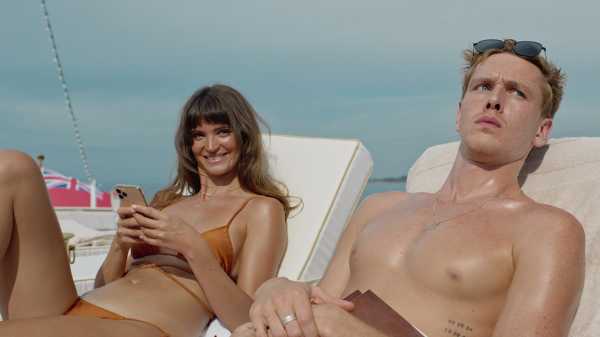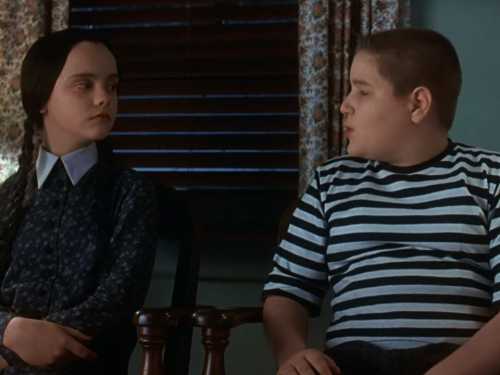
With his sourly playful satire “Triangle of Sadness,” the Swedish director Ruben Östlund shoots fish in a barrel and displays them with an adventurer’s pride. He takes on the easy targets of the obliviously rich and their glamorous entourages and delivers a handful of café-table insights and would-be outrages that seem calculated to the millimetre. It’s a movie of targeted demagogy that pitches its facile political stances to the preconceptions of the art-house audience; far from deepening those ideas or challenging those assumptions, it flatters the like-minded viewership while swaggering with the filmmaker’s presumption of freethinking, subversive audacity. Of course, “Triangle of Sadness” (which opens Friday in theatres) won the Palme d’Or, the highest prize, at this year’s Cannes Film Festival.
The protagonists are two models, Carl (Harris Dickinson) and Yaya (Charlbi Dean). Their relationship is dominated by fights over money, reflecting their profession’s casual precarity. Carl is introduced at an audition where a dozen or more male models wait around, shirtless, while being prepped by a wrangler who has them pose and emote on command; the models alternate between the cheerful expressions that sell mass-market clothing and the dour ones of high-end designer fashion. Carl’s audition is a torment of superficiality and scrutiny. (The title of the film refers to the lines between his eyebrows, and his prospective employers are heard whispering of Botox.) At a fashion show where he’s a spectator, his disposable spot in the scene’s pecking order is emphasized in a runway-show kerfuffle over seating. It’s in such moments that Östlund’s surest manner is revealed: at his best, he’s a filmmaker of fine points—delicate indicia of poignant humiliations exposing characters to cruel truths about themselves—which he realizes in scenes and images of a clean precision. (The scene that revolves around seating, featuring a long, slow tracking shot, could have been part of a silent film.)
But Östlund’s strongest suit and his strongest inclination are in conflict with each other; his keen observations are submerged in his efforts at social criticism and political philosophy. When Yaya and Carl fight over picking up the check at a fancy restaurant, the extended proceedings discharge their meaning in a pair of quickly delivered lines: Carl says that she makes much more money than he does; Yaya responds that her career is likely shorter, especially if she gets pregnant. The film is sardonic about modelling, but there’s nothing satirical in its view of the business or of the couple’s self-aware place in it. The movie attempts to expands its range with Yaya’s side job as a social-media influencer, which gets the pair a cabin on a yacht cruise for a self-selecting handful of the blithely wealthy, but this plot turn, which takes over the film, prompts Östlund to transform his cast of characters into a sociological cross-section of secondhand types.
The emblem of the cruise is the team of assault-weapon-toting guards who are conspicuously posted on the deck. The belowdecks crews of manual laborers are almost all nonwhite—the cleaning crew comprises mainly Southeast Asian women, and the engine-room workers mostly Black and brown men. As the cruise gets under way, the service staff, a dozen or so young white people in crisp, white-shirted uniforms, meets under the command of the cheerily martial Paula (Vicki Berlin), who exhorts them to say “Yes, sir,” and “Yes, Ma’am,” with hearty enthusiasm, and to never say no to anything—even if a guest is requesting an illicit substance or a “unicorn.” (Unfortunately, this elaborate scene adds little to a similar one, of staffers at a summer hotel-resort, in Busby Berkeley’s “Gold Diggers of 1935”—complete with its race-based distinctions.)
Not only does “Triangle of Sadness” mock Yaya’s work as an influencer; it sets up Carl and Yaya as frivolous wannabes, even riper for a takedown than the rich with whom they hobnob, because they enjoy the same privileges without selling their souls but merely their images. The hollow simulacra of humans surrounding them on this ship of fools include Dimitry (Zlatko Burić), a Russian oligarch who boasts of selling “shit,” i.e., fertilizer; plus a British arms merchant named Winston (Oliver Ford Davies) and his wife, Clementine (Amanda Walker), who lament the international ban on land mines and its effect on their fortune. There’s also a friendless software creator (Henrik Dorsin) and a haughty woman (Mia Benson) who insists that the ship’s sails need washing. (The ship has no sails.) In a characterization that reveals Östlund’s crass sense of humor, there’s a running joke about a woman named Therese (Iris Berben), who is disabled by a stroke and aphasic, able only to call her husband by name and speak the phrase “in den Wolken” (“in the clouds”).
The protagonist of the voyage is the yacht’s captain (Woody Harrelson), an alcoholic who stays locked in his cabin, drunk, blaring a recording of the “Internationale” while reading leftist texts (he declares that he’s not a Communist but a Marxist) and ignoring the entreaties of his crew. The result of his neglect is the scheduling of a formal dinner for all guests on the night of a storm; the ship rocks wildly in the waves, leading to a tragicomic epidemic of seasickness, complete with projectile vomiting and a literal shitstorm erupting from the vessel’s toilets. Spoiler alert: it sounds like more fun than it looks. Östlund may not hesitate to make his characters miserable, but he spares the audience (or, rather, keeps an eye on the box-office), making sure that the excremental scenes stay well short of revulsion; their grossness remains theoretical.
A handful of small-scale scenes deliver quiet but sharp jabs to viewers’ ribs regarding the cavalier display of casual power. Carl, jealous of Yaya’s wink at a shirtless and handsome deckhand (Timoleon Gketsos), salves his pique by lodging a petty complaint to Paula, only to witness the punitive results. Dimitry’s wife, Vera (Sunnyi Melles), making a spectacle of her egalitarian sympathies, tries to reverse roles by ordering a crew member (Alicia Eriksson) to abandon her duties. (The logical conundrum is quick and cutting.) But Östlund’s grandiose sensibility unfortunately dominates the film, both in its political bombast (as in a scene of the captain and Dimitry drinking wildly while trading leaden political witticisms; Dimitry’s rely on the collected works of Ronald Reagan and Margaret Thatcher) and in the major pivot that occurs midway through. I won’t spoil this much, except to say that a motley batch of passengers and crew members end up stranded on a deserted island, forced into raw survivalism in a state just above that of nature, where money is useless and power relationships are drastically altered in ways that are utterly unsurprising and commonplace, even if they do lead to a clever trick ending.
Only the fine cast lends life to the movie’s superficial caricatures, even if the hectic, blatant script edges the performances toward the clattery side and Östlund’s precise but stiff direction leaves little room for inventiveness. In particular, Berlin’s rendition of authoritarian cheer and Dolly de Leon’s steadfast assertiveness as a long-suffering staffer leave high-relief impressions. As Clementine, the munitions-maker’s spouse, Walker delivers the best line in the film, with the perfect blithering lilt. Above all, the movie’s cast is shadowed by Charlbi Dean’s death, in August, from a lung infection, at the age of thirty-two. Although “Triangle of Sadness” sticks closer to Carl, the mercurial, elusive Yaya is the dramatic engine of the film, which would be nearly inert without Dean’s labile, coolly impulsive performance. If nothing else, the movie would have assured her stardom; there’s no telling how many characters and films her death foreclosed before their conception. ♦
Sourse: newyorker.com






